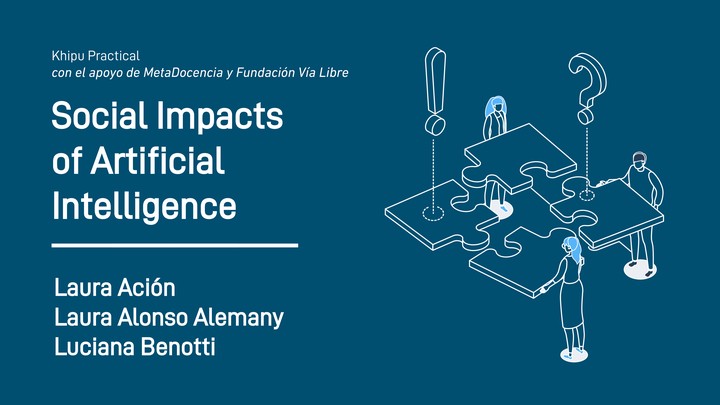Social Impacts of Artificial Intelligence

This site is under construction and will be changing in the following weeks.
This workshop will be offered in English in person for persons attending Khipu 2023, Latin American Meeting In Artificial Intelligence gathering at Montevideo in March. During the rest of 2023 a longer version of this workshop will be offered online in Spanish, more news coming soon.
Table of Contents
Objectives
In this practical you will learn to use different tools to assess how stereotypes can result in discriminatory behavior in language technologies and reflect on their social impacts. You will explore biases in large language models and word embeddings. Working in groups, you will find strengths and limitations in the representations of stereotypes and the different approaches to model bias. This is an introductory course and no previous natural language processing (NLP) knowledge is required.
After this practical you will be able to:
- Explain the value of an ethical approximation to Data Science problems
- Link machine learning technial knowledge to the social impacts of this technology
- Learn and use concrete tools to identify biases in large language models
- Have access to further references about these topics
- Access resources to continue learning about these topics and connect with a diverse group of colleagues also interested in these topics throughout Latin America
Practical’s intended public
There are no specific requirements for this practical, you will experience it best if you bring a laptop.
When we designed this practical, we had Sasha, Federico, Esther, Javier, and Sandra in mind.
-
Sasha has a Master’s in Physics and is pursuing her PhD in Complex Systems. They are a naturally shy person and sometimes finds it difficult to develop topics that do not have a strong technical structure, although they realize social issues and interpersonal skills are key in data science applications. Read more about Sasha here.
-
Federico is finishing his undergrad degree in Math and has been working in a medium-sized Latin American technology company for 18 months as a machine learning engineer. He likes to code, he’s a vegan, and he believes deeply in social justice. He believes that AI can be the solution to many of humanity’s problems. Read more about Federico here.
-
Esther is a sociologist and has been working for decades in different technical areas of the Mexican public sector. She knows very well the written rules and unwritten customs of the different public administrations that handle massive data. She has taken courses on modernization and open data, however, they have seemed unclear and of little practical use. Read more about Esther here.
-
Javier is the founder of FunData, a small Latin American company that implements AI software in the medical domain following the proposals of a US-based research team. Javier is very well connected in the AI field and strongly believes in the economic potential of collaborating with those doing AI research but doesn’t understand the technical details of the current technology. Read more about Javier here.
-
Sandra is a Project Manager of software projects with machine learning components. She works for a financial consulting company. She wants to incorporate ethical issues into the project planning and monitoring methodology and identify issues that require further investigation in the requirements-gathering process, from an ethical point of view. Read more about Sandra here.
Not included in this workshop
Since we only have 2 hours, a lot of things will be out of reach of this practical. Among other things, we will not learn:
- In-depth theoretical principles of large language models (LLM)
- Analysis of non-open source LLMs such as ChatGPT
- Automatic techniques for bias mitigation
- Benchmark comparisons of metrics for bias analysis
- Addressing questions such as: Are these technologies inevitable? Do they need to evolve faster than their regulation? Do these technologies bring actual progress to humanity? Do they cause harm? Who does benefit from advancing these technologies?
- How to bring domain experts into the core of the AI development and decision-making
How to participate
The workshop is free to attend for those attending Khipu and will abide by Khipu´s code of conduct. More details for registering to this workshop can be found at Khipu’s website.
Duration
This is a 2-hour workshop with one interval (ideally away from your screen) of approximately 10 minutes.
Schedule
| Time | Activity |
|---|---|
| Time to start showing up to the practical room and finding a place to plug your laptop, making sure you have good access to the room wifi | |
| 17:30 - 17:35 | Establishing ground rules to minimize frustration during the practical |
| 17:35 - 17:45 | Introduction |
| 17:45 - 18:05 | Stereotypes and Bias |
| 18:05 - 18:25 | Is my language model discriminatory? |
| 18:25 - 18:35 | Break away from the screen |
| 18:35 - 19:05 | Exercise: Is my language model discriminatory? |
| 19:05 - 19:20 | A word is worth a thousand sentences |
| 19:20 - 19:25 | How to continue this type of learning on your own |
| 19:25 - 19:30 | How can we improve this workshop? |
Practical materials
Do you want to re-use any of our contents? Please, be our guest!
Our materials are available for free under this license. You can reuse or edit any material that appears here, the only thing we ask in return is that when you reuse our materials you include a reference to this website.